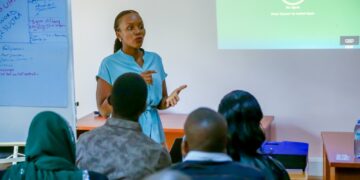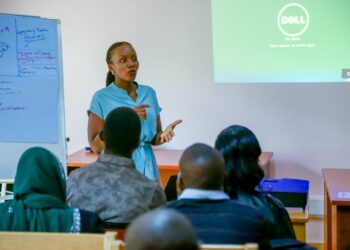By Leonard Kamugisha Akida,
NATIONAL
Medical experts have said there is no scientific evidence to support men sucking Women’s Breasts cancer as a prevention for breast cancer.
Dr. Alfred Jatho, an oncologist and Head of Community Cancer Services at the Uganda Cancer Institute, Kampala says the claim is unscientific, but noted that men could help in early detection of breast cancer through foreplay.
“There’s no evidence yet currently that a man sucking the breast can be protective in terms of reducing breast cancer risk,” said Dr. Jatho.
The oncologists noted that breastfeeding and breast sucking are not in any way synonymous: “The protection offered by breastfeeding is hormonal in nature,” Dr. Jatho explained. “Breast milk production is influenced by specific hormones that, over time, lower certain health risks for the mother. In addition, breastfeeding fosters psychosocial bonding between the mother and the baby. A baby can consume up to a liter of milk a day, something an adult man cannot generate. So, there’s no protection for a man in sucking his wife’s breast.”
He urged women to do regular cancer screenings and improve their healthy lifestyles which he says are critical for breast cancer prevention.
“Breast sucking is a manual activity that lacks these specific hormonal changes. As advocates of cancer prevention, science should guide us,” added Dr. Naghib Bogere, Oncologist at UCI.
Bogere explained that breast cancer affects both men and women but it’s common in women than it is in women.
In Uganda, breast cancer is the second leading causes of morbidity and mortality after cervical cancer. The World Health Organisation has warned that the number of cancer patients is expected to double in the next two decades with a commensurate number of healthcare workers required to care for them.
The Executive Director of the Uganda Cancer Institute Dr. Jackson Orem said 90% of breast cancer are curable, but attributed the rising cases of cancer to patients who seek medical care late. This he says lowers survival chances.
“Each year, Uganda records more than 4,000 new cases of breast cancer.Over 23% of all new cases of cancer in women are constituted by breast cancer. And it usually affects women between the ages of 50 to 50 years. It doesn’t mean that breast cancer is a common disease,” Dr. Orem said. “And there are many who will remain undiagnosed and usually become at an advanced stage. Yet, when caught early and in a timely manner, 90 percent of cancer are curable.”
He also dismissed the misconception surrounding cancer as a curse or witchcraft, stating that individual health is influenced by a combination of factors, including genetics, lifestyle, and overall health.
The ED also maintained that breastfeeding has some protective factors because it has to do with hormonal changes, unlike breast sucking which is just a manual activity that lacks specific hormonal changes.
“Lactation, usually leads to delayed menstrual cycles in most women, conferring protection from achieving a new pregnancy, prematurely, just by reducing exposure to oestrogen, (a hormone that can play a role in the development of breast cancer).
Oncologists further advised lactate mothers to breastfeed their children for at least 18 months to two years to enable protection of the baby from certain infections. That oestrogen withdrawal for those many months reduces the risk it confers for breast cancer.
According to the experts, it was important for husbands to be breast aware and join their wives to be breast vigilant to reduce their risk of breast cancer. This is because men play a crucial role in the early detection of breast cancer, and helps in fighting stigmatisation.
“Encouraging male involvement in advocacy for increased uptake for screening for early detection and adopting cancer prevention strategies. It also reduces fears, discrimination against patients with breast cancer in their workspace and market space,” Dr. Orem added.
Scientists say breast feeding babies reduce risks of breast cancer by 4.3 per cent every 12 months of breastfeeding.
According to the American Centre for Disease Control and Prevention, in addition to lowering a mother’s risk for type 2 diabetes and high blood pressure, breastfeeding can also lower a mother’s risk of breast and ovarian cancers.
“A recent study found that only about one in four people think that a woman is less likely to develop breast cancer later in life if she breastfeeds.” “It’s important to know that breastfeeding helps not only a baby’s health but also that of the mother,” CDC stated.







































